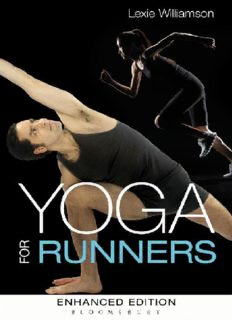
Yoga for Runners PDF
Preview Yoga for Runners
CONTENTS Acknowledgements Introduction 01 Yoga and running 02 Running tall 03 Relaxation in motion 04 Balance training 05 Lower leg stretches 06 Upper leg stretches 07 The runner’s core 08 Runners’ power yoga 09 Mental training 10 Breath control 11 Recovery yoga ACKNOWLEDGEMENTS I would like to thank running gait expert Mitchell Phillips, podiatrist Dr Brian Fullem, orthopaedic surgeon Nicholas DiNubile and fellow Yoga Sports Coach™ Anthea Sweet for their valued contributions to Yoga for Runners. I would also like to acknowledge the runners who supplied quotes: Duncan Haughey and Daniel Everall of the Elmbridge Road Runners, and blogger Hannah Dunnell. A huge thank you to my super-fit models Rory Spicer, Sarah Bowen, Sam Bishop and Lindsey Brown who found time in their training and work schedules to provide the visuals. Thank you John-Paul Bland for your superb photography. Finally, a huge thank you to the family Williamson: Cameron, Finlay, Lauren, Skye and my husband Tom. INTRODUCTION The idea behind Yoga for Runners, and its cycling counterpart, was to offer practical, sport-specific yoga in the style of a training manual that appealed equally to men and women. I was keen to get away from the outmoded views that yoga is a) only for women and the super supple, and b) must involve chakras, chanting or tying yourself in impossible pretzel-like knots. All the models in this book are runners, triathletes or decathletes with realistic levels of flexibility. I have written this book taking into account the hours you spend running. If you have limited range of motion, knee issues or tight hamstrings there is a pose in this book for you. A huge range of sportspeople, from runners and cyclists, to soccer and tennis stars (think Scott Jurek, Cadel Evans, Ryan Giggs and Andy Murray) include yoga in their strength and conditioning regimes and interest amongst sportspeople is steadily increasing. The primary reason for this is usually injury avoidance. Yoga is famous, first and foremost, as a stretching discipline. A regular yoga practice can help runners side-step common running injuries like iliotibial band syndrome or plantar fasciitis, especially if accompanied by massage and adequate recovery time. But as the chapter headings show, there’s a lot more to yoga than ironing out muscular kinks caused by pounding the streets or traversing the trails. Yoga can be used to positively enhance running performance, be it focusing a jittery mind, breathing easier, running taller or even sleeping deeper. I hope you enjoy exploring the complementary relationship between running and yoga. Stretching is really just the beginning. YOGA AND RUNNIING ‘ I took up yoga for flexibility, body awareness and ’ centred focus. Scott Jurek, ultrarunning champion, Eat and Run (Bloomsbury, 2012) This is not a stretching book. It’s not a book about breathing techniques, core strength, balance, posture or concentration. Yoga for Runners includes all these physical and mental elements of yoga, adapted specifically for runners. Every single posture and technique is traced back to running performance, from maintaining pace through breathing rhythms to using relaxation to recharge for tomorrow’s run. Running is a fantastic cardiovascular workout that floods the body with feel- good endorphins. Many find its repetitive nature a natural stress reliever. The downside of this repetitive motion is that it taxes a few select muscle groups (hamstrings, quads, hip flexors and calves) and underuses the rest. Over time this imbalance restricts fluid running form and can trigger the overuse injuries that commonly beset runners. Yoga addresses this by re-establishing balance. It lengthens muscles, realigns joints and stabilises the body through strengthening postures so the runner is better equipped to cope with the rigours of running. ‘Yoga is like pressing the “reset” button for body and mind’, explains Duncan Haughey, Chairman of the Elmbridge Road Runners club in Surrey, UK. ‘It allows me to be ready to train hard again the next day.’ It is true that for many runners yoga has an injury prevention – or ‘prehab’ – role. But it can also positively impact running performance in so many ways by improving running posture, aiding proprioception and sharpening the mind. In this sense yoga is truly a whole-body discipline, addressing the runner from the soles of his feet to the thoughts in his head. How you use this book will depend on a number of factors:
Description: